Let’s be honest, most of us love shiny new kit. Adorning your pride and joy with a fancy component can be a great motivator to get out riding more.
However, some mountain bike parts have more of a performance benefit than others – whether you’re looking for speed, control, comfort or just more fun on the trails.
So, we’ve compiled a list of the best mountain bike upgrades that we think will make the biggest difference to your experience in the saddle.
Mountain biking isn’t a cheap hobby, so we’ve suggested the best budget options alongside the best products available in each key component category.
These are all pieces of gear or other options that we’ve used ourselves and which have received a great score from our test team.
Dropper post
The dropper post is one of our favourite mountain bike products, and we can’t imagine going back to a time without one.
Being able to lower your saddle height with a push of a lever when descending opens up a world of fun (and makes downhills safer), while raising the seat back up allows you to maintain an efficient seated position for pedalling up climbs and along flatter sections.
There are more options on the market than ever, but here are two of our other favourites. Otherwise, head to our round-up of the best dropper posts for more.
Ultimate upgrade | RockShox Reverb AXS
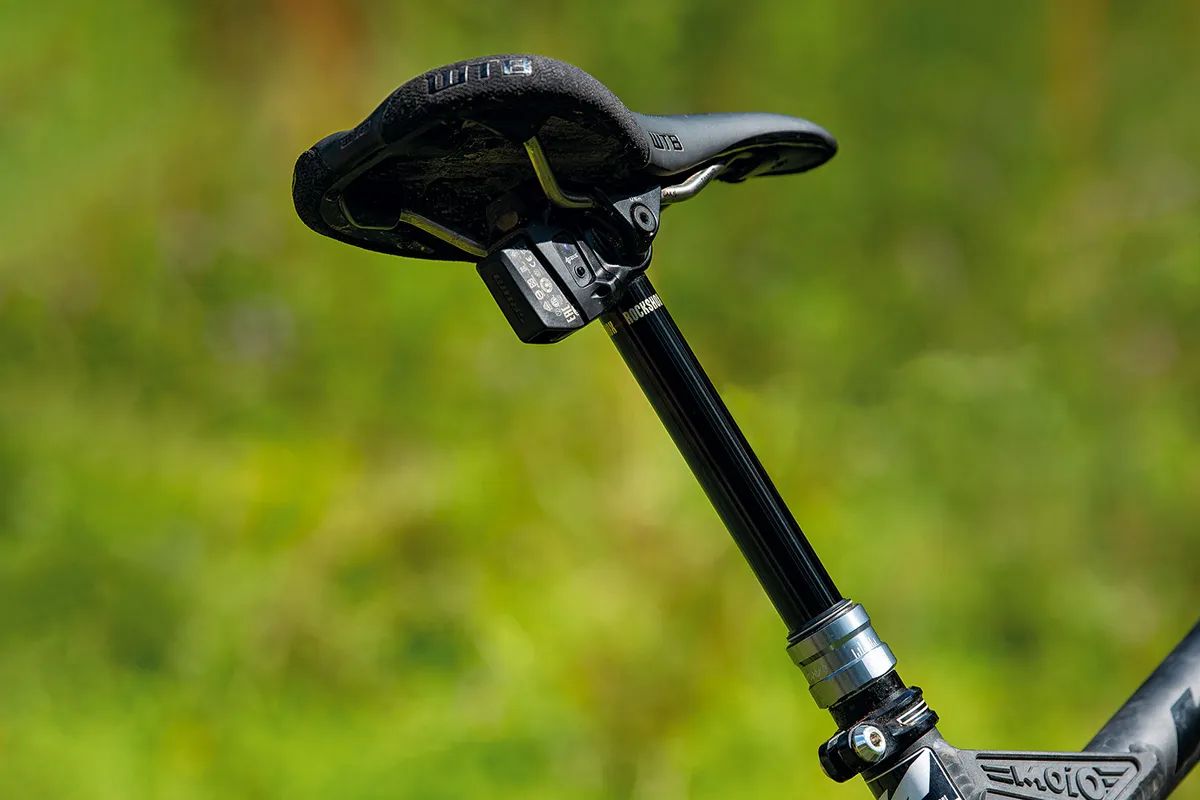
- Price: £791 (with remote) as tested
Like parent brand SRAM’s Eagle AXS electronic gear-shifting, the Reverb AXS dropper works wirelessly. With no cable or hose to thread through your frame, installation is pain-free.
The remote and post communicate using SRAM’s encrypted wireless network and, once bolted in, need to be synced in order to work. This is done by pushing each of the components’ AXS buttons, whose LEDs also allow you to check battery life.
We’ve found that the post will last for around 40 hours of riding before it needs charging (which only takes an hour), while the remote’s battery (a CR2032) should last a couple of years.
You can also connect both the post and remote via Bluetooth to the SRAM AXS app, which monitors battery life and logs mileage.
Wireless treatment aside, the Reverb post is a top performer. It was given a significant overhaul in 2019, inside and out. The internal floating piston was redesigned to reduce friction, and the post now uses a lower-friction oil and new grease.
Up top, the saddle is clamped with a single bolt, while a second bolt lets you adjust its angle.
This works really well and we’ve had no issues with our seat shifting. That said, we weren’t able to fit one perch (a carbon-railed Fabric model) because its rails were too tall to sit comfortably in the clamp.
At the base of the post sits the Vent Valve, used to remove any squish it might develop, should the air and oil inside ever mix. We haven’t needed it, but it’s good to know it’s there.
The Reverb AXS is available in four travel options (100, 125, 150 or 170mm), with lengths varying from 340 to 480mm, and in three diameters (30.9, 31.6 or 34.9mm).
The 150mm version weighs a respectable 650g (plus 63g for the remote). After months of hard use, all our samples are still running smoothly, despite poor weather and plenty of blasts with the hose.
We really like the push-button actuation and rapid reaction time. The lack of effort required to hit the remote is great, especially when riding technical terrain, where the post’s speed allows you to make small adjustments with total ease.
This is aided further by the lack of lag after pushing the remote, which means it’s just as fast and easy to use as a well set up mechanical post.
While the price may be hard to swallow, we’re big fans of the Reverb AXS. Plus, if you have more than one bike, it can be swapped between them in minutes.
Budget upgrade | OneUp Components V2
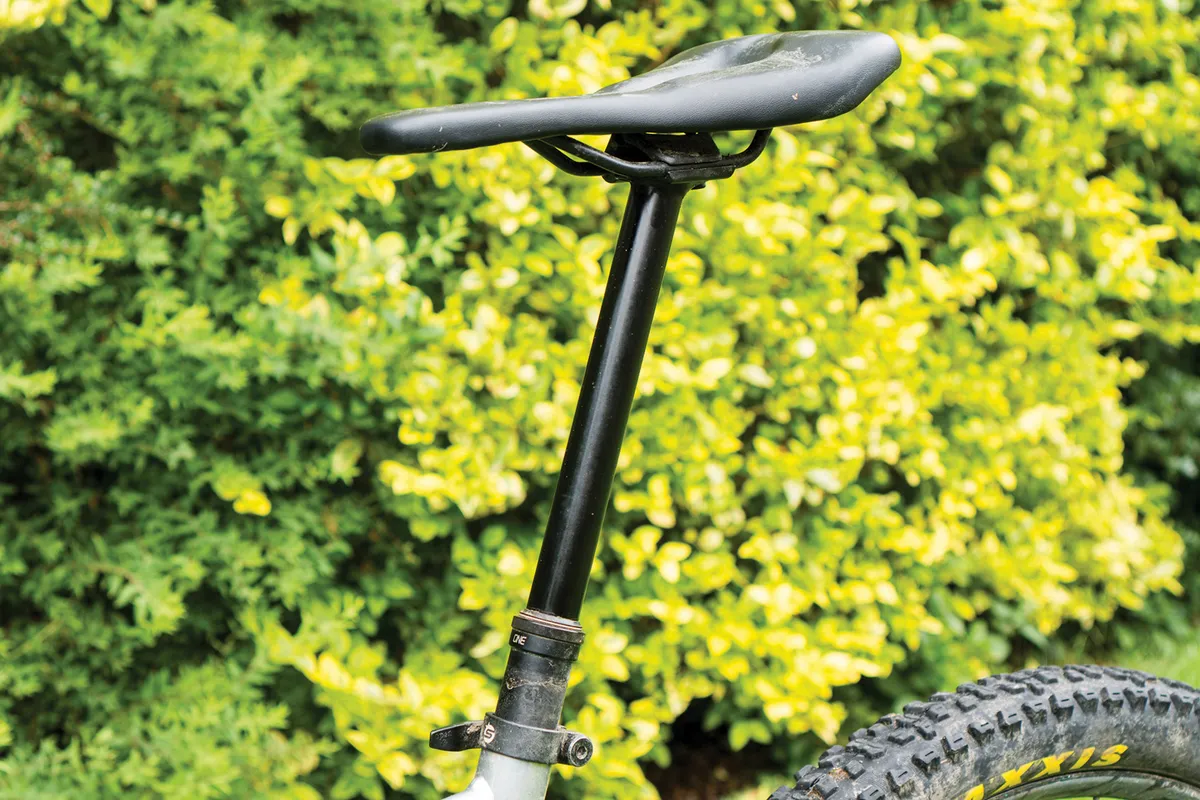
- Price: £200 (without remote) as tested
OneUp’s latest post comes in six options with between 90 and 240mm of drop, each of which can be shimmed down by 20mm.
All have impressively short maximum extended heights (seat collar to saddle rails) for their travel, so you can run a longer drop than on other posts, allowing you to get your seat lower for the descents.
With the V2 fitted, we got fewer kicks up the backside from the saddle on steep downhills and were able to get further over the rear of the bike.
The post performs virtually flawlessly too, remaining smooth and returning consistently.
We haven’t used the new 240mm version yet, but we’ve had no problems with the smallest-diameter (30.9mm) 210mm-travel version, even though this configuration puts more strain on the bushings than bigger-diameter, shorter-drop options.
While the V2 can lose some air pressure over time, topping it up is simple and restores full performance.
The post isn’t sold with a lever, but it’s compatible with most cable-clamped-at-the-bar remotes, so buying OneUp’s £49.50 V2 shifter-style lever may not be necessary.
This works well and feels smooth, but doesn’t have the ‘weighty’ feel we’d like. Just £249 for the V2 dropper and remote is a cracking deal in its own right, though, before you factor in the significant performance upgrade over longer posts with a smaller drop.
Testing this post left us asking the question, “why haven’t we upgraded sooner?”
Suspension fork
Forks have always been top of the desirability chart as far as upgrades go.
The best mountain bike forks can significantly affect how you engage with the trail, improving grip, comfort and confidence – all huge factors in increasing the fun factor.
A new fork is no small investment, however, so it’s worth remembering that suspension set up correctly, that's well-maintained and serviced, will outperform a superior design that isn’t given sufficient TLC.
Ultimate upgrade | RockShox Pike Ultimate RC2
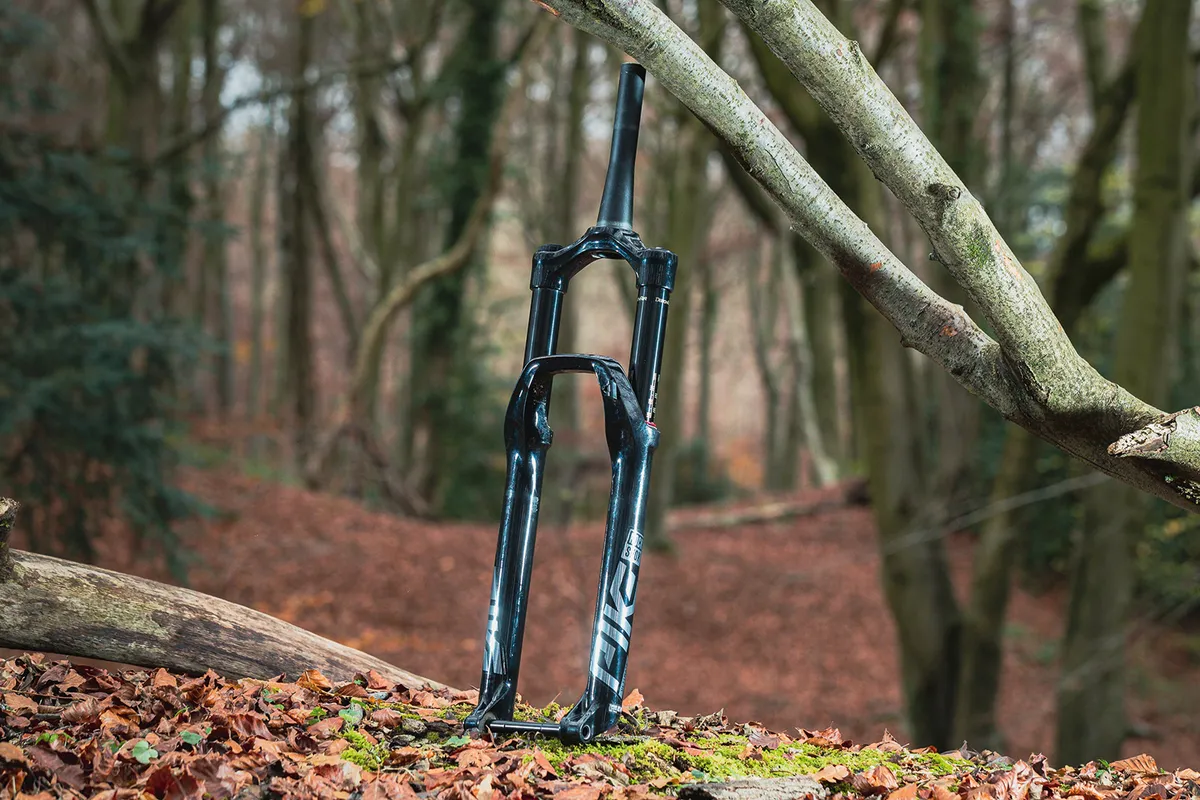
- Price: £919 as tested
RockShox’s top-tier trail fork features external high- and low-speed compression damping adjustment, plus a low-speed rebound dial. The US brand has spent plenty of time fine-tuning its 35mm-stanchion fork range, and the Pike chassis is stout and stiff while still being lightweight.
We’ve never had any doubts about pushing it hard through rough corners or deep holes, and it stands up well to everything. While the beginning-stroke sensitivity isn’t the absolute best, grip and front-wheel tracking are good.
The Pike Ultimate doesn’t offer the ultimate in mid-stroke support, either, but it will hold up the front end adequately during hard hits and steep descents and makes plenty of use of the middle part of its travel; it’s this freedom of movement that gives it such impressive comfort on the trail.
Square-edged bumps and repetitive hits are handled with a composed and forgiving feel that its rivals struggle to match, taking the sting out of the trail remarkably well with its buttery, plush action.
What’s more, we’ve never found ourselves at the limits of the Pike Ultimate’s damping range and the rebound is fast enough that the fork can return to full travel between hits, helping to maintain its ride height and use its full stroke.
You get 17 clicks of low-speed compression damping, which seems excessive but does let you fine-tune the amount of support on offer.
We’ve found that one volume spacer gives enough progression. While the Pike Ultimate is ‘travel happy’, we’ve had no issues with it bottoming out easily.
Overall, its balance of composure and suppleness is unbeaten, plus it’ll work for a range of riders, and it’s a good price for the performance on offer.
Budget upgrade | Fork service
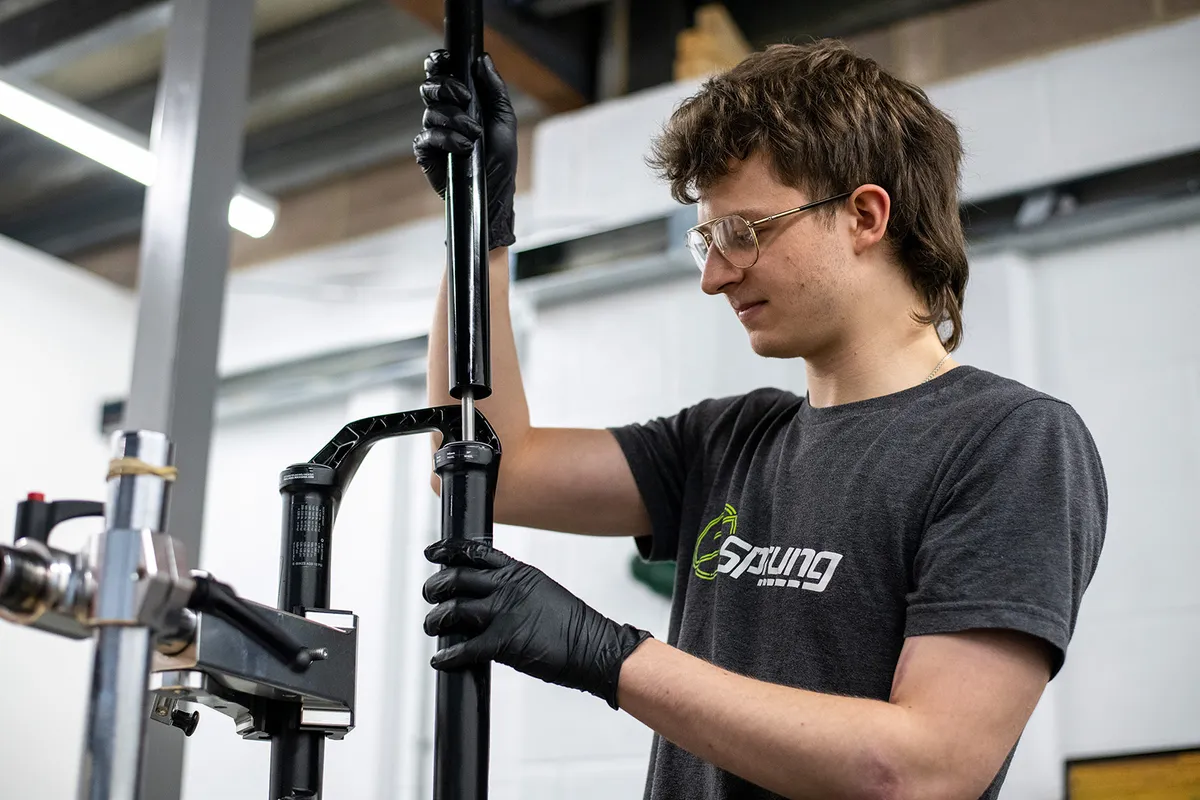
- Price: From £100
Taking your fork in for a service or retune is the best way to keep it in tip-top condition and have it feeling like new again.
Any moving part needs maintenance to perform at its best, and suspension is particularly prone to losing performance, because it relies on being as frictionless as possible, and dirt, dust and water ingress, along with oil and grease degradation, will decrease this.
A full service from a company such as Sprung or TF Tuned usually costs around £115. You can keep your suspension working better by cleaning the stanchions or shaft after every ride and lubing the seals.
Saddle
Few parts have the potential to make your ride miserable like an uncomfortable saddle.
While saddle fit is subjective and backside shapes vary, there are a few models that tend to suit most riders well. Be sure to take the time to find the right bike saddle for you. It’s particularly important to find the correct width.
Ultimate upgrade | Specialized Phenom Comp with MIMIC
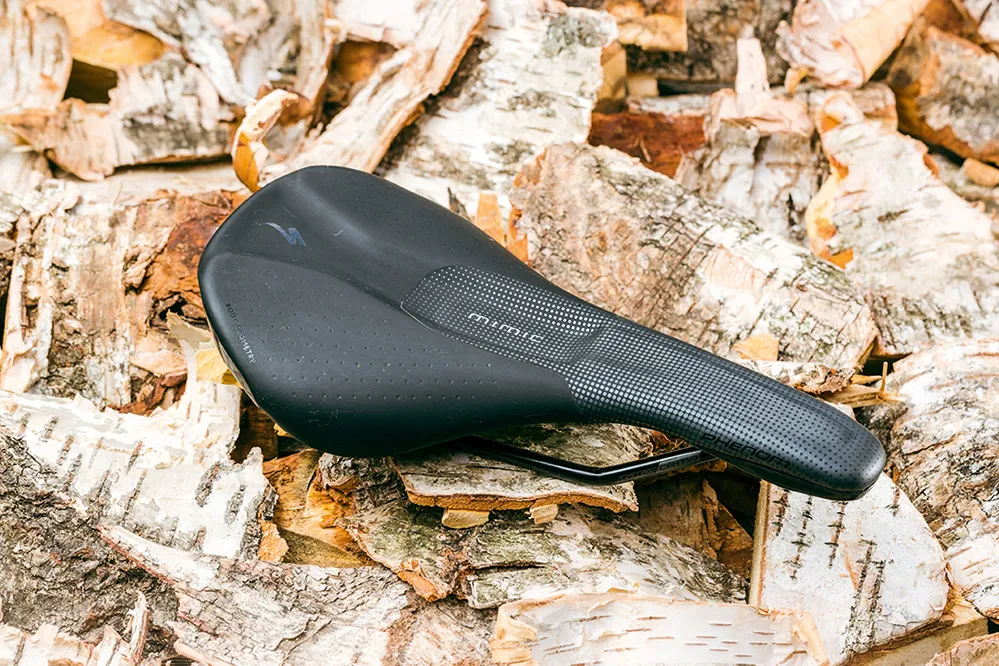
- Price: £95 as tested
Specialized’s MIMIC padding was developed for women but is now being marketed for unisex use. Our male testers loved how the soft padding extends onto the nose, for comfy climbing.
It’s fairly flat, with a subtle concave dip. The short 260mm length is good for aggressive riding. Its carbon-fibre reinforced shell is neat, and you can fit Specialized's SWAT accessories at the back.
Budget upgrade | Gusset S2 AM
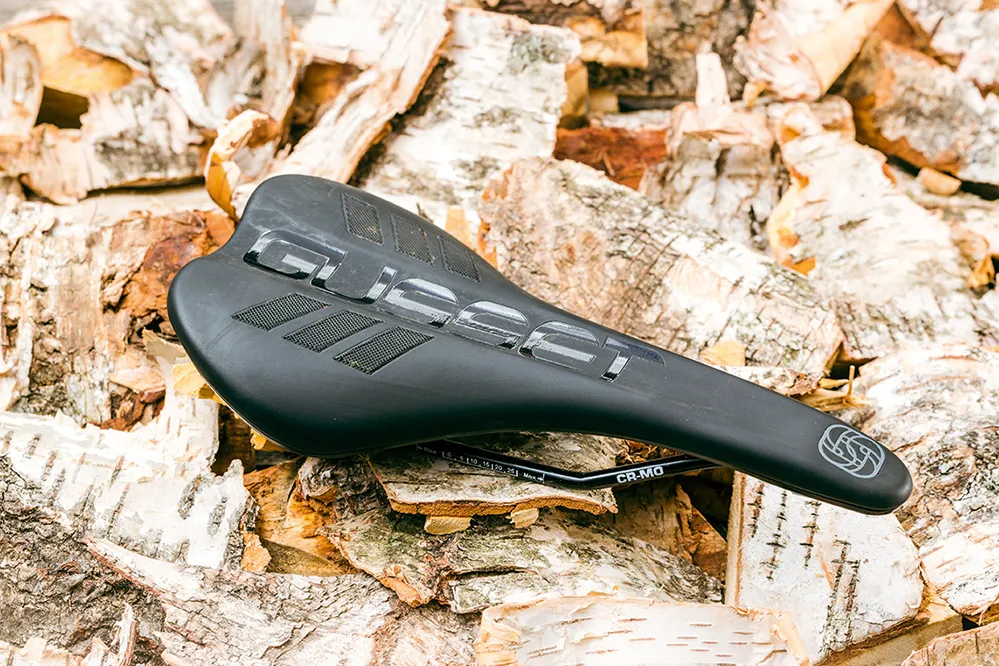
- Price: £45 as tested
At 280mm, the S2 AM is longer than most and tapers into a slim nose that offers good manoeuvrability. Padding is minimal and firm, but sufficient for all but the longest stints in the saddle.
The S2 has a flat profile, but the rubber grippers in the cover keep your backside in place until things get too muddy. The chromoly-rail model and the version with carbon fibre rails and a carbon-injected base are great value for money.
Mountain bike grips
Grips are one of your direct points of contact with the bike and provide comfort, control and vibration-damping.
There are dozens of designs available, featuring different diameters, lengths, rubber hardness, patterns and clamping options.
Finding the best mountain bike grips for you and your riding style is well worth it, but here are two of our favourites.
Ultimate upgrade | Chromag Format
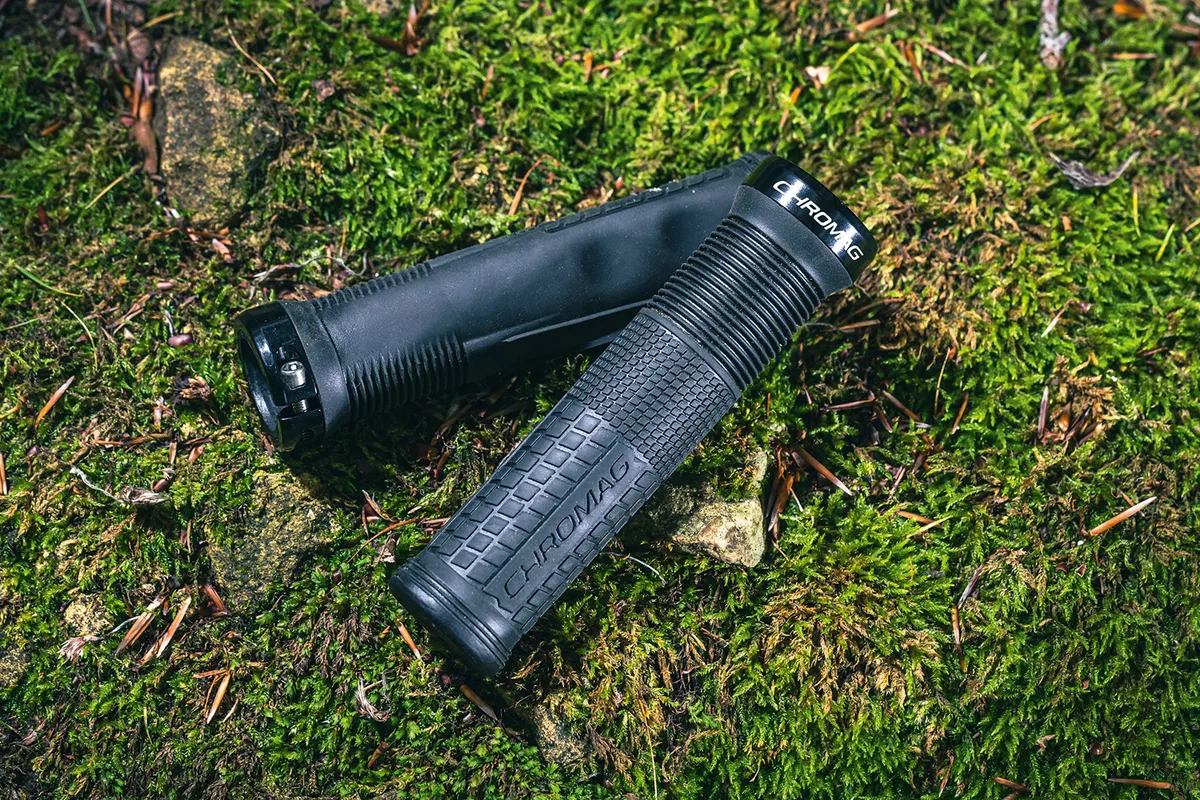
- Price: £23 as tested
Considering how good the Chromag Format grips are at damping vibrations coming through the bar, the direct handling you get from these slim-feeling grips is impressive.
The finger ridges do a decent job of adding mechanical grip, even though the Formats aren’t the biggest grips, and the ribbing for thumb comfort is softer than most.
A subtle outboard flange adds support when resting your hands right at the edge of the bar. We didn’t always find our fingertips sat in the indents, though.
Being a single-clamp style, the bar end is covered, so you can’t use your handlebar for stealthy tool storage.
Budget upgrade | Santa Cruz Palmdale
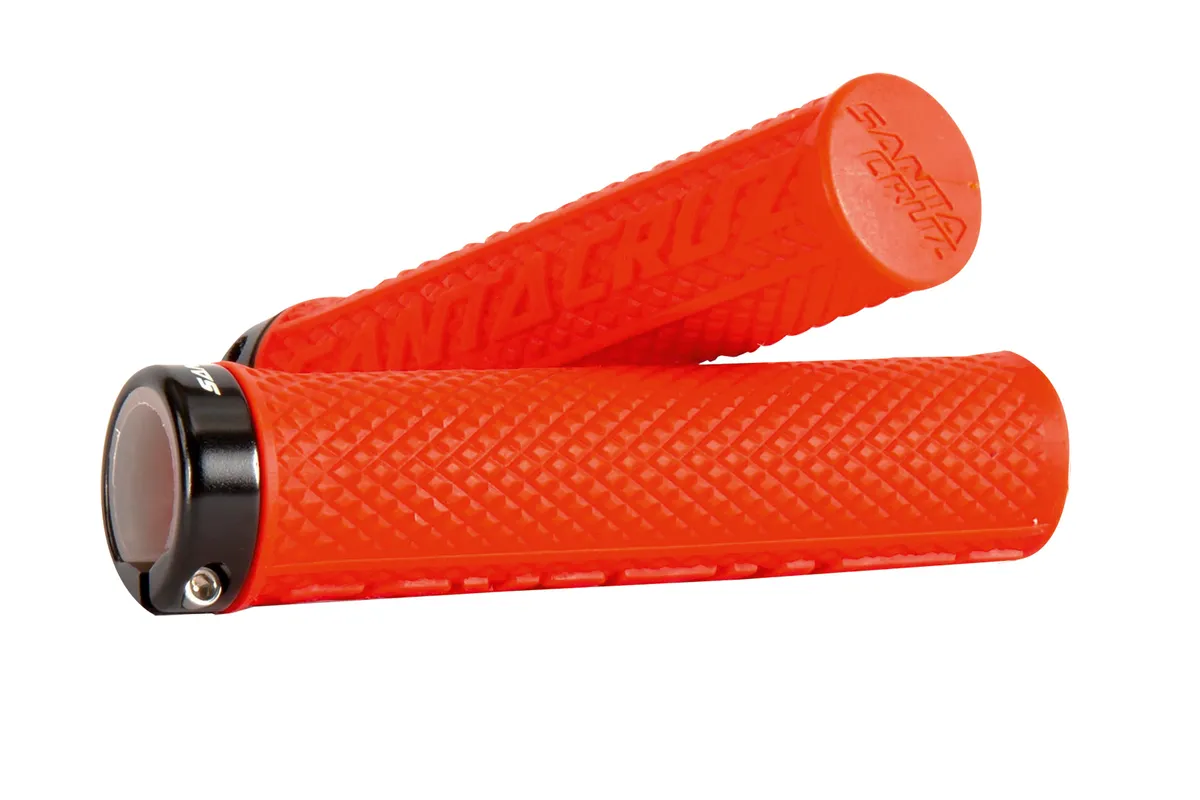
- Price: £18 as tested
These are some of the comfiest grips out there and the go-to choice for several of our testers. A single lock-on collar with a 3mm bolt clamps the grip tightly in place and ensures twist-free use, even in sodden conditions.
The outside edge has a slight taper, which isn’t noticeable but means you can comfortably sit your hand right at the end of the bar. With a diameter of 31mm they’re pretty thin, but the soft rubber stops your hands feeling battered.
The knurled pattern and tacky rubber help keep your hands in place, while the raised logo on the underside gives extra purchase for pulling up on the bar. They come in 12 colours and cost less than £20.
Handlebar
Bars shouldn’t be overlooked because they play an essential part in your riding experience.
The best mountain bike handlebars can have a positive effect on how you control the bike, by letting you push, pull, lean and move around. In addition, their size, shape and construction all contribute to ride feel and comfort.
Ultimate upgrade | OneUp Components Carbon
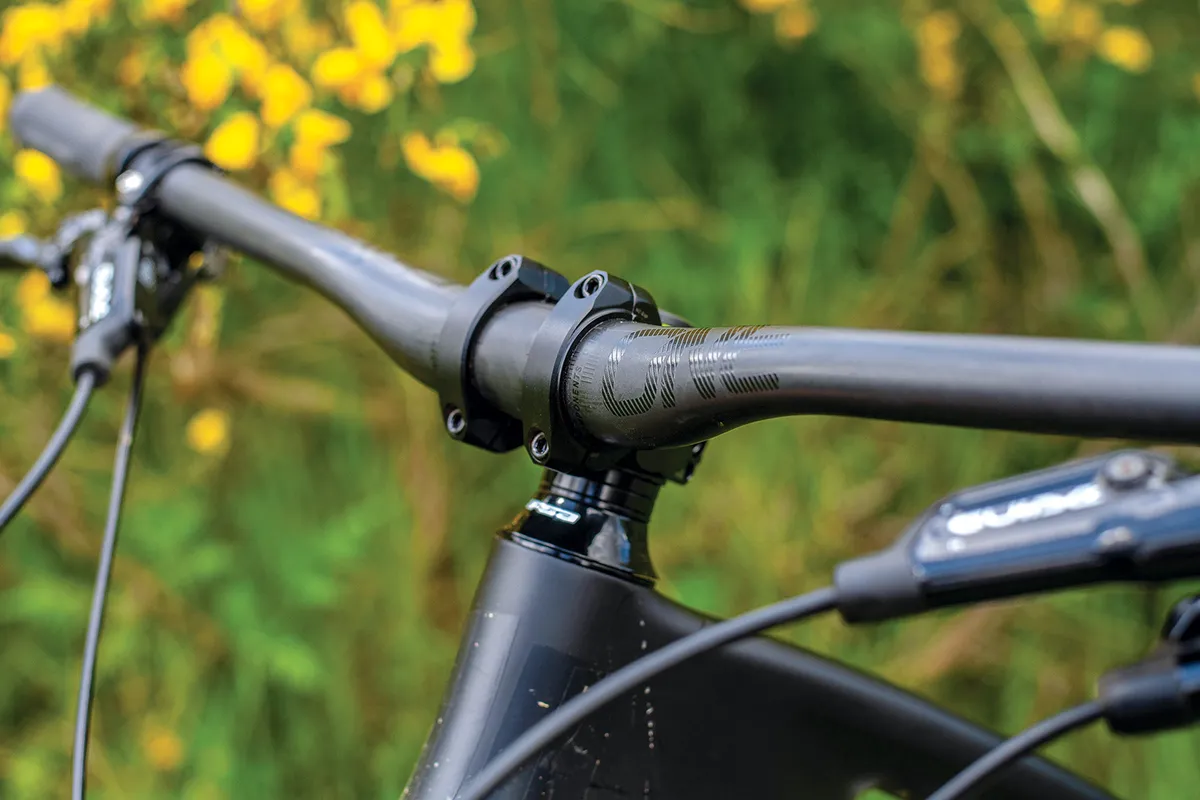
- Price: £130 as tested
A common criticism of 35mm-diameter bars is that they’re too stiff and contribute to arm fatigue. To overcome this yet retain the strength of an oversized clamp area, OneUp’s bar has a flattened profile around the rise to increase compliance (engineered flex).
This makes it very good at damping vibrations, without feeling vague. At 800mm wide, with an eight-degree upsweep and five-degree backsweep, the geometry puts you in an attacking position, plus there’s a choice of a 20mm or 35mm rise. The 220g weight is good, too.
Budget upgrade | Renthal Fatbar 35
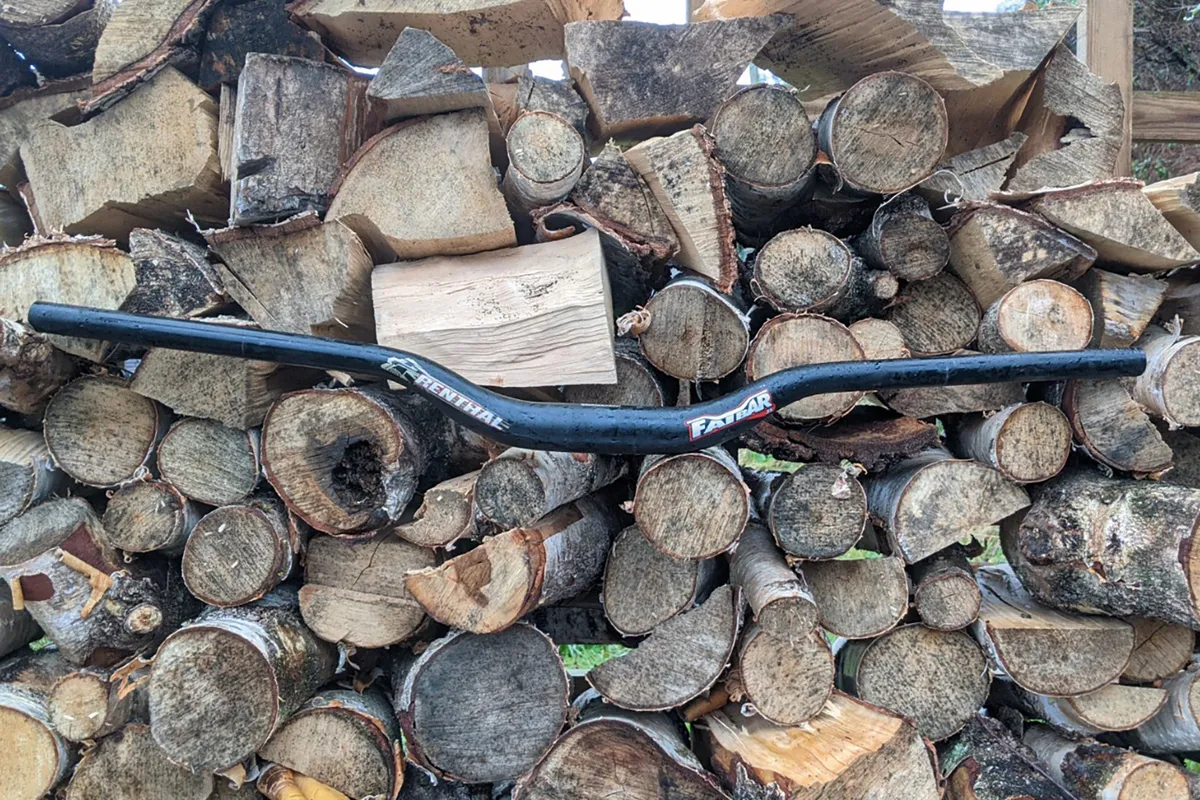
- Price: £89 as tested
Controls stay in place far more securely on alloy bars than on carbon fibre bars for a given torque setting, and they’re less prone to crash damage, too, so we’ve included the aluminium Fatbar35 here for comparison.
The seven-degree backsweep makes it a good choice for riders who favour a forward, elbows-out position and makes it slightly easier to weight the front wheel. It’s one of the comfiest bars out there, not feeling too different from Renthal’s carbon Fatbar.
At 303g (40mm rise, 800mm width), this bar is heavier than its carbon competitors, but not by a noticeable amount when riding.
Pedals
Pedals are an essential piece of kit for maintaining control of your bike, whether you ride clipped-in or prefer flats.
Having your feet in the right place and keeping them there gives you a stable platform to move around the bike, meaning you can turn, hit jumps and drops, and blast through rough, choppy terrain with confidence and commitment.
A pair of the best mountain bike pedals should last a while, and pedals would be one of the first upgrades we recommend you buy.
Ultimate upgrade | Crankbrothers Mallet E
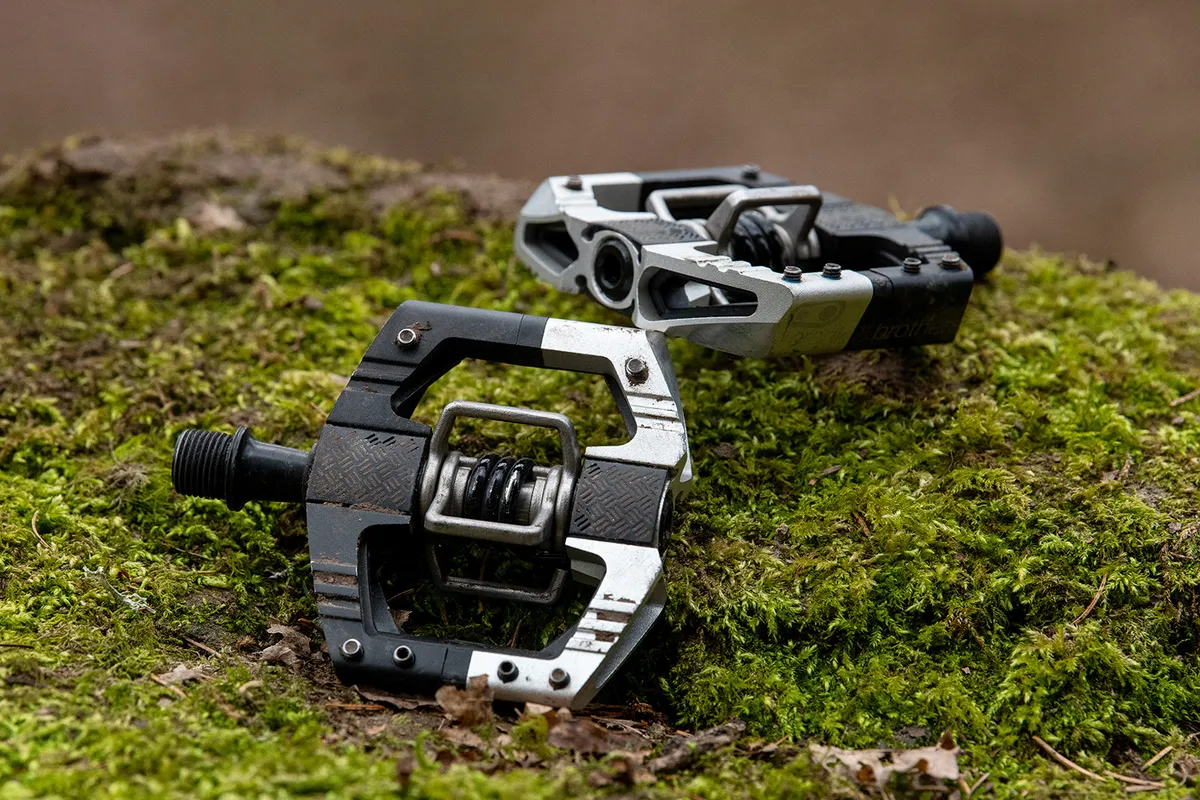
- Price: £165 as tested
Marketed for enduro, the mid-size Mallet E pedals are spot-on for trail riding, too.
The two-piece platform provides a great balance of foot support, weight and ground clearance. Shoe contact is good out of the box and can be adjusted via 12 grub-screw pins per pedal, cleat spacers and plastic ‘traction pads’.
The free-spinning Eggbeater mechanism doesn’t clog with mud easily and can be clipped into from multiple angles. Float (0 or 6 degrees) and release angle (10 or 15 degrees) are controlled by the cleats.
The Mallet Es come in 52 and 57mm axle lengths, with the wider stance making for more confident descending. They run on high-quality linear Igus (inboard) and sealed Enduro (outboard) bearings, helping to justify the high price.
Budget upgrade | Gusset Slim Jim CNC
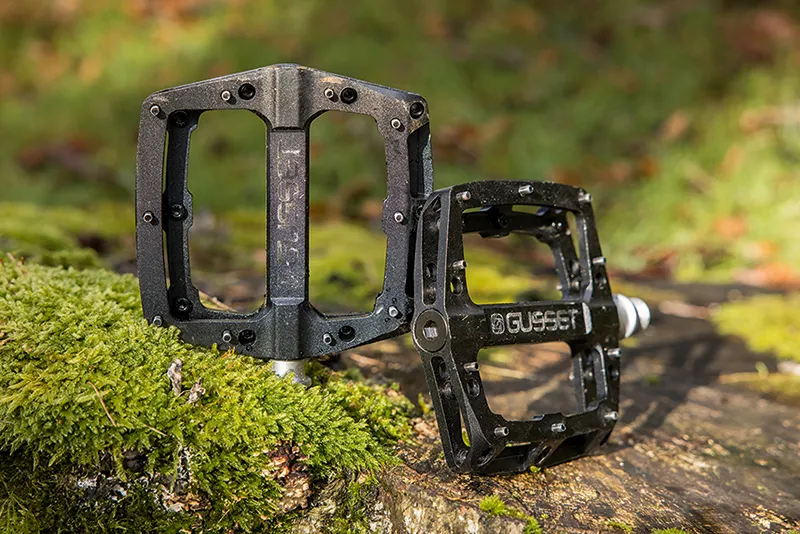
- Price: £70 as tested
A new take on the venerable Slim Jims, these flat pedals offer impressive performance and weight at a price that pits them closer to composite pedals than most equivalent alloy ones.
The CNC-machined 6061 aluminium body houses a chromoly axle that rotates on an LSL bushing and sealed cartridge bearing. A pedal rebuild kit costs just £13.
The platform has a slightly concave shape and is chamfered front and rear. Despite not feeling huge, your feet are stable and supported, which helps improve control and reduce fatigue.
Sharp, well-positioned pins provide immense grip and prevent your foot from twisting. The pedals come with 10 replaceable back-loading pins positioned around the perimeter, plus eight spares.
We’d love to see the same design with a slightly larger platform, but for the price they’re great.
Tyres
It can never be overstated how much the best mountain bike tyres can improve both control and comfort.
There’s always a compromise to be struck between rolling speed and grip, so you’ll need to find the right rubber for your riding style, the terrain and the ground conditions you’re likely to ride in.
Ultimate upgrade | Schwalbe Magic Mary Super Trail ADDIX Ultra Soft
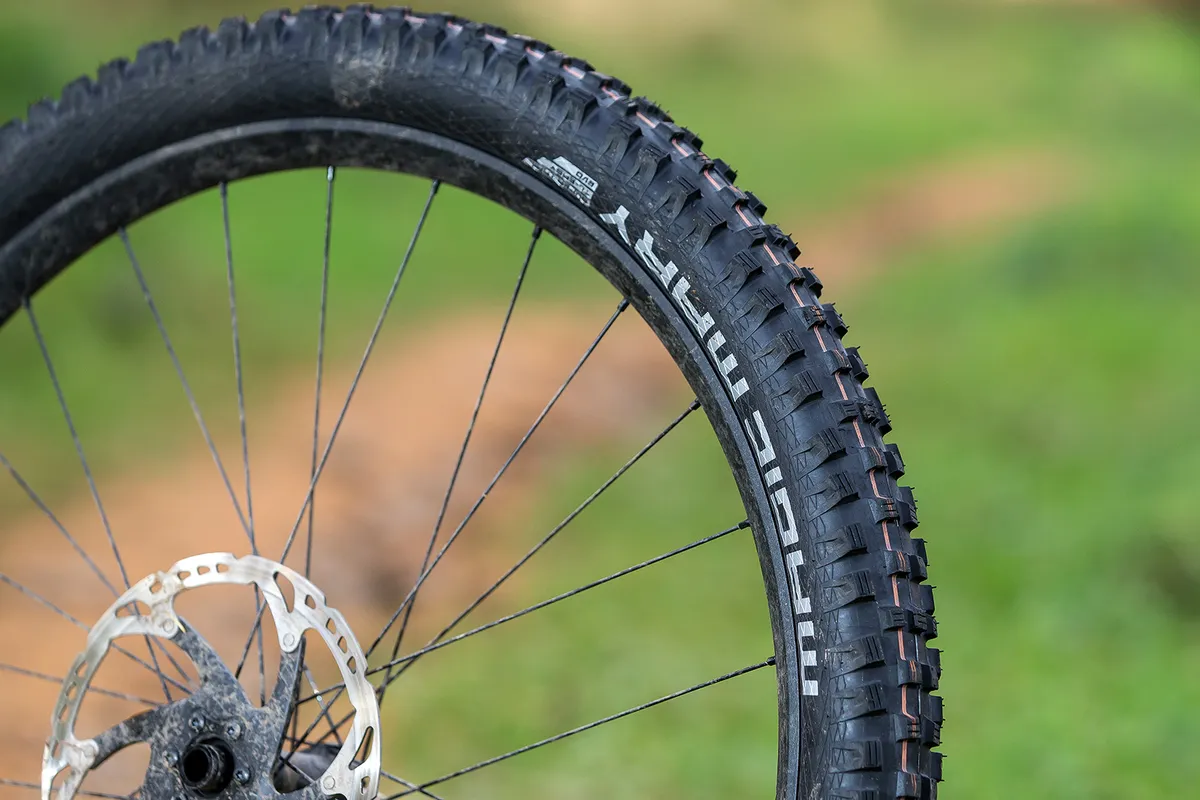
- Price: £67 as tested
Schwalbe’s Magic Mary is still the best all-rounder for gravity-fuelled riding. Grip is impressive in most conditions, through corners and on cambers, and the ADDIX Ultra Soft compound makes short work of slippery roots and rocks.
It also holds its line and damps bumps well for its weight, which all adds up to inspire confidence.
Mud clearance is good, too. However, because it’s heavy for a ‘trail’ tyre and uses soft rubber, it isn’t the easiest to pedal and rolls relatively slowly. Schwalbe does offer firmer compounds, though, which will help with this.
Budget upgrade | Specialized Butcher GRID TRAIL 2Bliss Ready T9
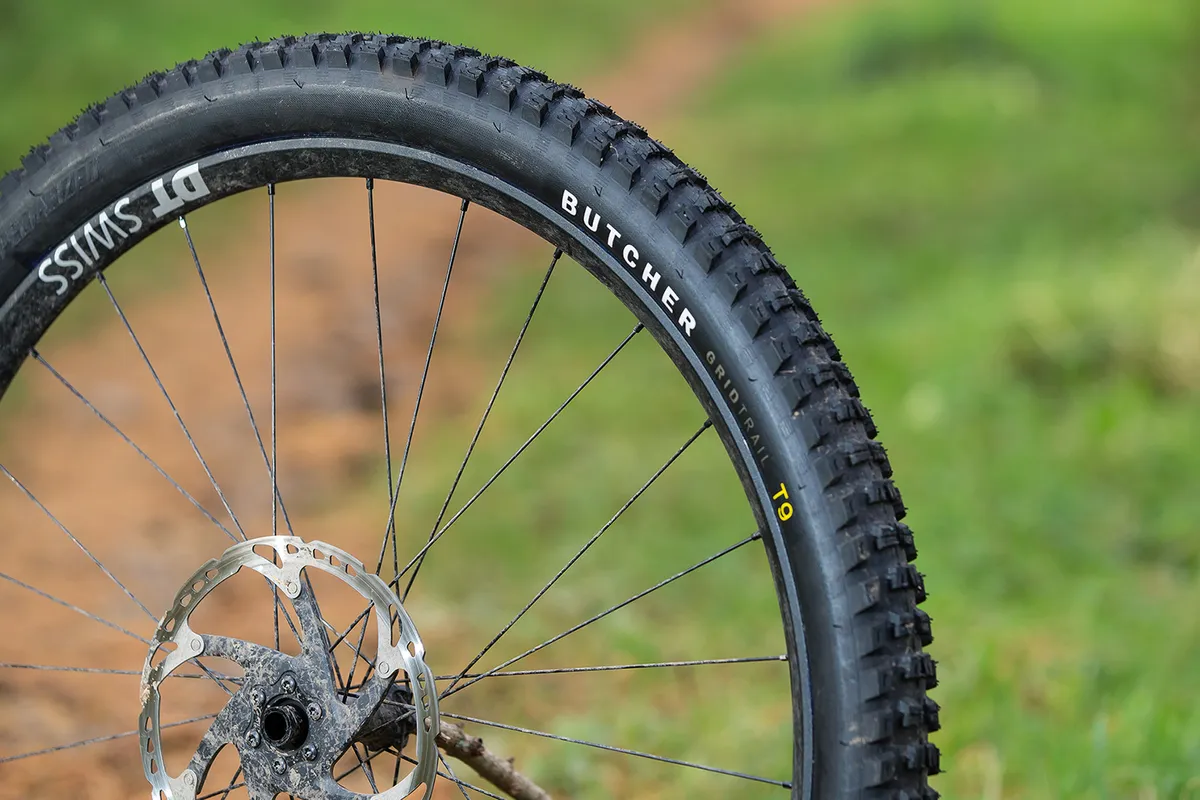
- Price: £45 as tested
This Butcher tyre uses Specialized’s soft T9 compound, which provides plenty of predictable traction over dry rocks and roots and hardpack terrain.
There’s also enough grip to allow good lean angles, despite the tyre’s relatively square profile, and the tread blocks have great stability, even when pushed hard.
Although the carcass is thinner than equivalents such as Schwalbe’s Super Trail, it has ample strength for a front tyre; it doesn’t flop in turns, and we haven’t suffered any rips or tears.
Because the centre blocks are fairly closely packed, it rolls well too. On wet trails the Butcher is less surefooted, not inspiring confidence over greasy rocks and roots, while in gloop the tread packs full of mud and struggles to shed it.
As an all-rounder tyre for those on a tight budget, though, it’s a good choice.
Brakes
The best mountain bike brakes can massively improve your confidence and fun on the bike.
It’s essential to have enough power to stop, with the right amount of modulation to control that power. Reach and bite-point adjustment are useful, with easy maintenance a bonus.
Ultimate upgrade | SRAM Code RSC
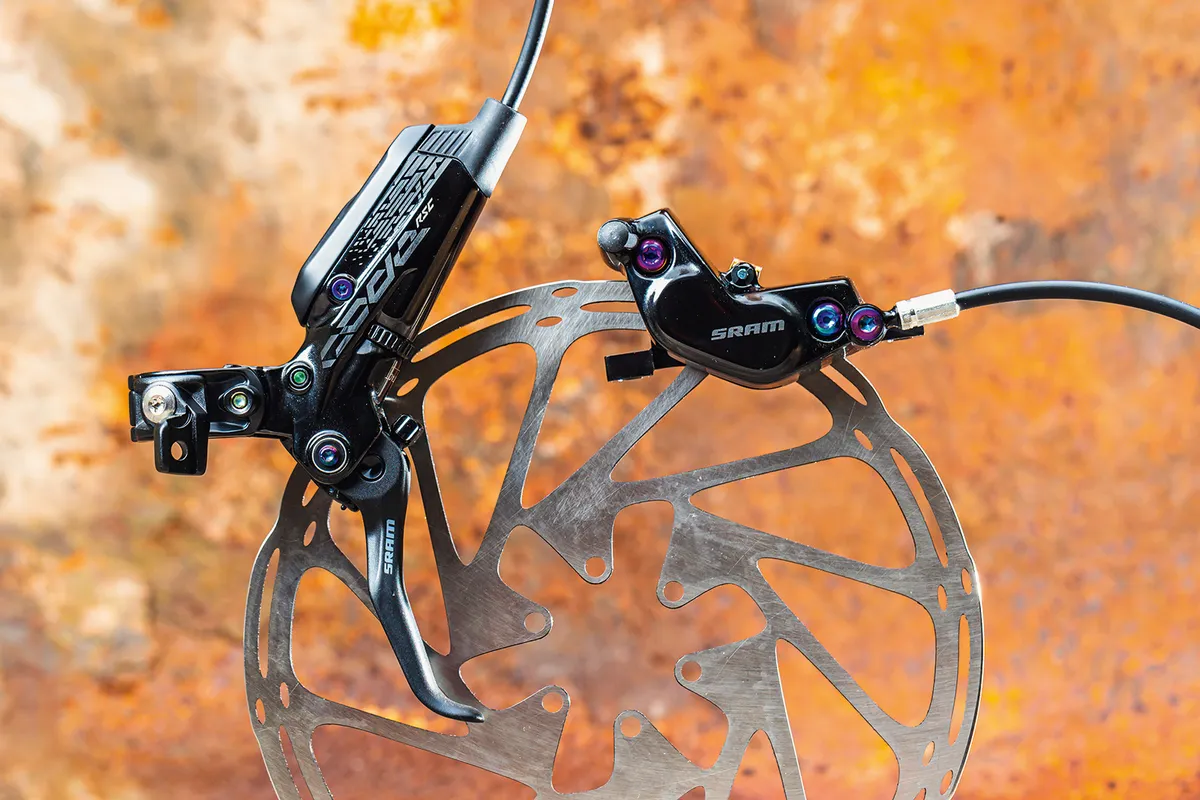
- Price: £230 (per end) as tested
The Codes RSCs are SRAM’s flagship big-power brakes, with a smooth, linear progression in stopping force. Initial bite is slightly muted, making it easier to manage the power in technical sections and on steep, tight tracks.
While they don’t have the lightest lever feel, there’s less resistance than on Shimano or Hope’s offerings, and the fairly long lever means you don’t have to squeeze too hard.
With flip-flop levers and hinged bar clamps that’ll hold a SRAM MatchMaker shifter or Reverb post lever (Shimano options are available aftermarket, too), the Codes are super-versatile.
Bleeding is a cinch with SRAM’s Bleeding Edge tool, and cutting/refitting hoses is easy. The Codes offer high power, excellent feel, quality construction, wide-ranging adjustability and easy maintenance.
Budget upgrade | Shimano MT501/MT520
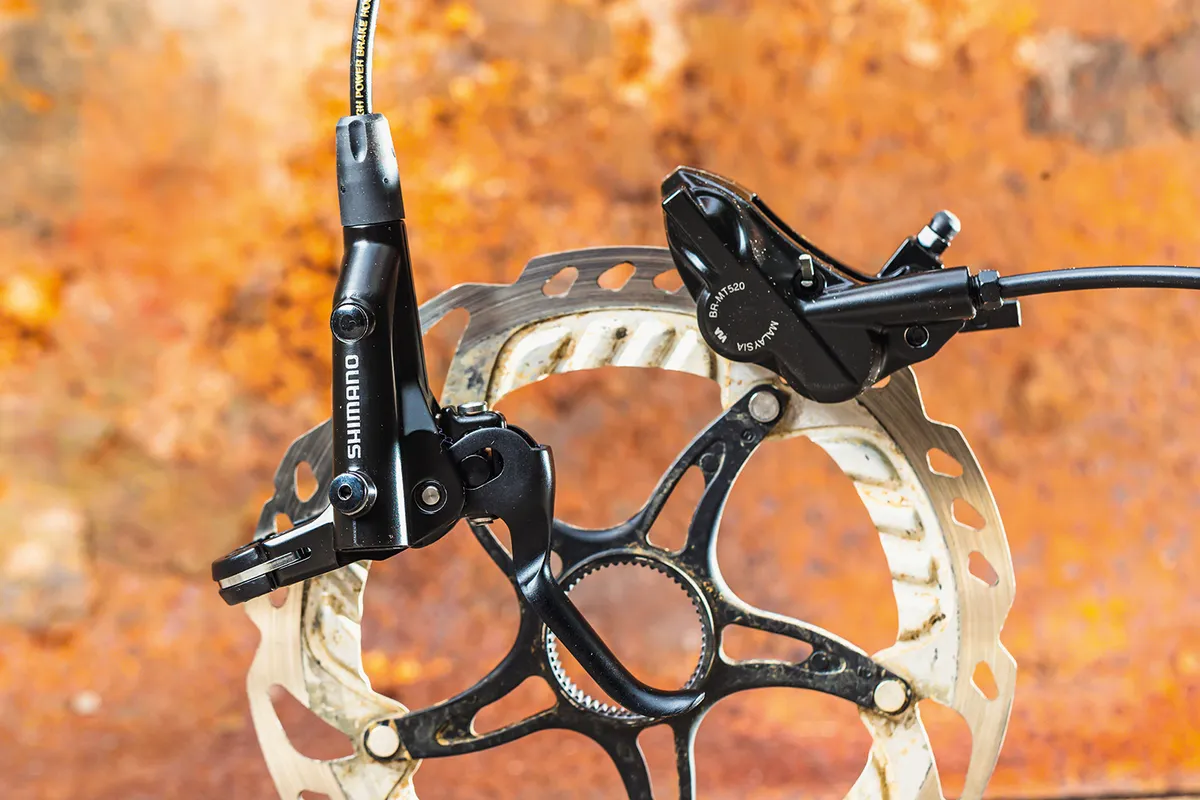
- Price: £100 (per end) as tested
Shimano’s entry-level four-piston brakes offer excellent power, a crisp lever feel and plenty of control. The action is lighter than that of the brand’s pricier XTR and SLX stoppers, despite the two-finger MT501 lever having the same ServoWave linkage.
In the mid-stroke it’s easy to modulate the power, but the range of lever squeeze is less than on SRAM and Magura brakes. At the MT520 caliper end, the pads are held with a split-pin that needs needle-nose pliers or a flat-head screwdriver to remove.
Bleeding is fairly easy but requires a 7mm spanner. Power-wise, these blow most brakes of a similar price out of the water.
Mudguards
If you ride in bad weather, mudguards are an essential piece of kit, keeping your eyes clear of mud, puddle splashes and dust, so you have clear vision down the trail.
There are plenty of options out there, but these are our favourites.
Ultimate upgrade | Rapid Racer Products ProGuard Bolt on
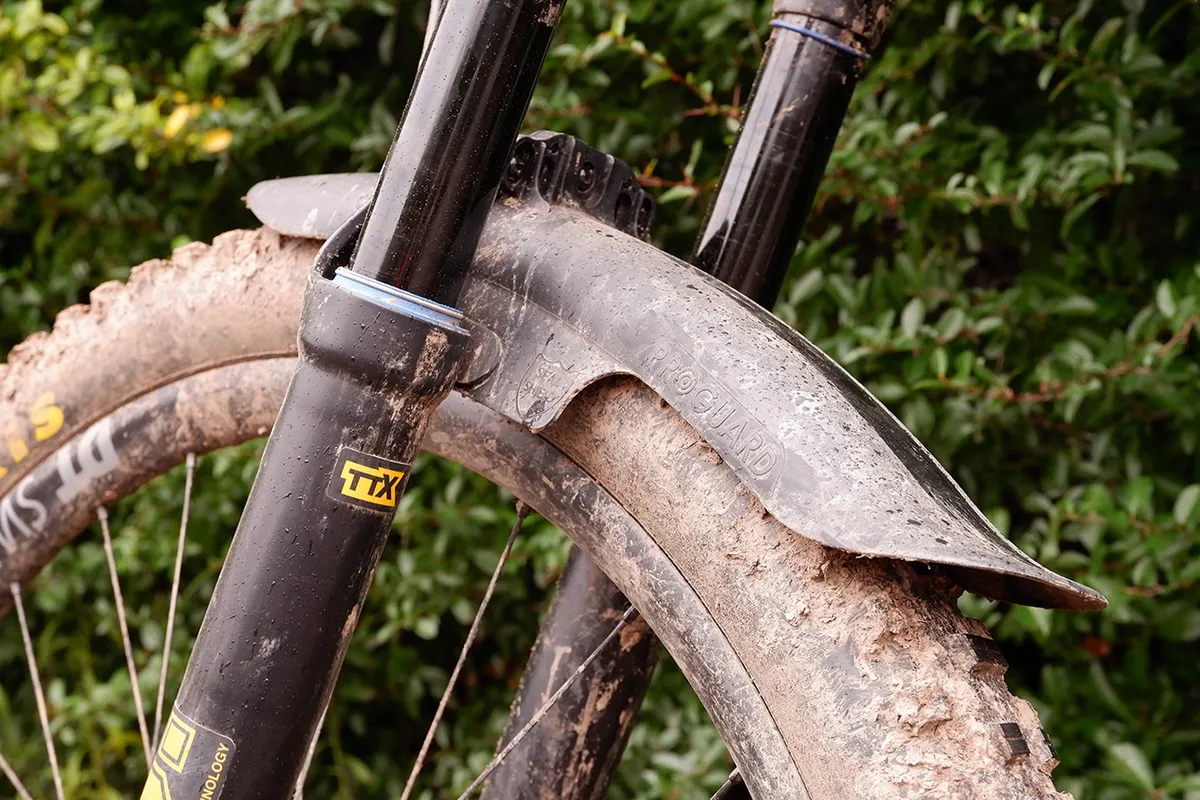
- Price: £37 as tested
If you’re after maximum coverage for the muddiest trail conditions, it’s hard to beat the Rapid Racer Products ProGuard BOLT ON. Its long length, both in front and behind the fork crown, prevents even the sloppiest mud from reaching your face.
The fork-seal guards do an admirable job, and the bolt-on design means it stays in place and silent no matter how rough the trail. Tyre clearance is decent, too.
Budget upgrade | Mudhugger Shorty Evo zip-tie
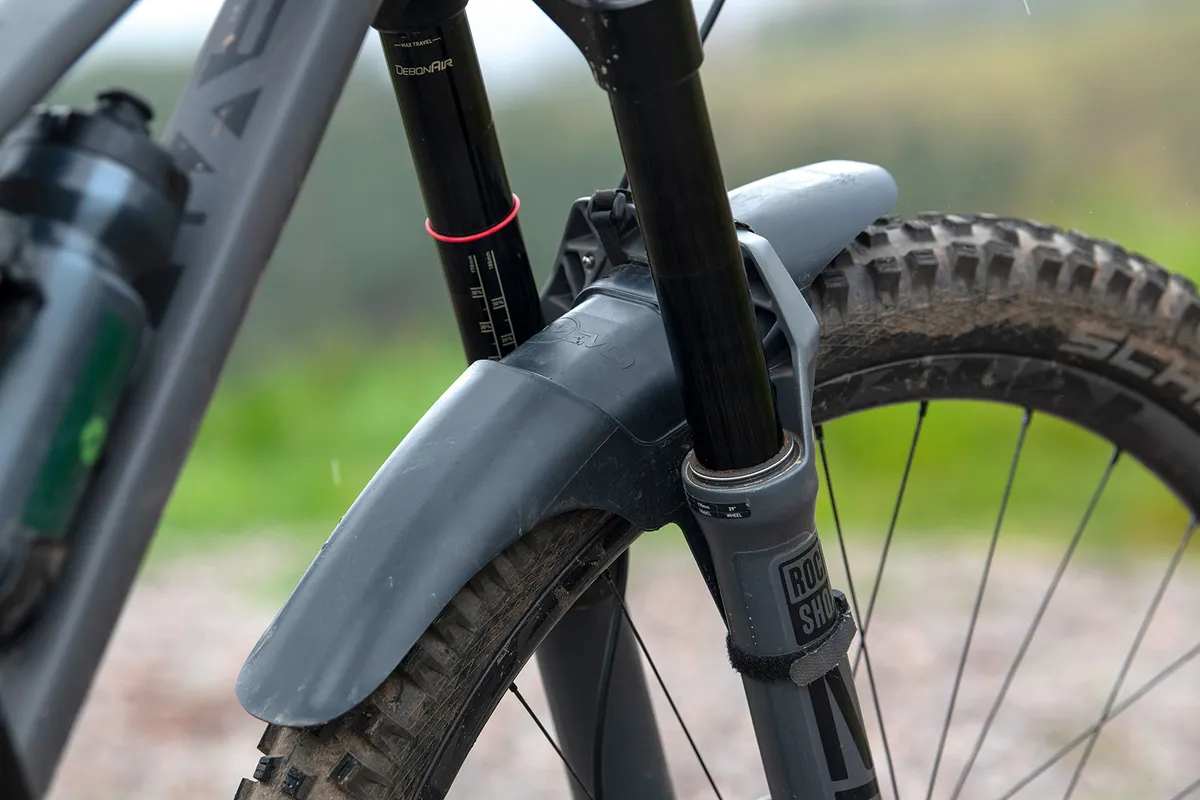
- Price: £22 as tested
The Shorty EVO is compatible with modern long-travel forks such as the RockShox Zeb and Fox 38, not causing any bangs or clunks at full travel.
The Shorty EVO's smaller design still gives plenty of protection but makes it lighter and more usable year-round. It can be fitted with zip ties or you can upgrade to removable Velcro straps (£2.50), which can be tensioned to hold it securely in place.
Wheels
Investing in a set of the best mountain bike wheels can give your bike a new lease of life and help improve its feel and performance, whether through weight-saving, impact protection, improving tyre grip or all three. Thankfully, there are excellent hoops for most budgets.
Ultimate upgrade | Zipp 3Zero Moto
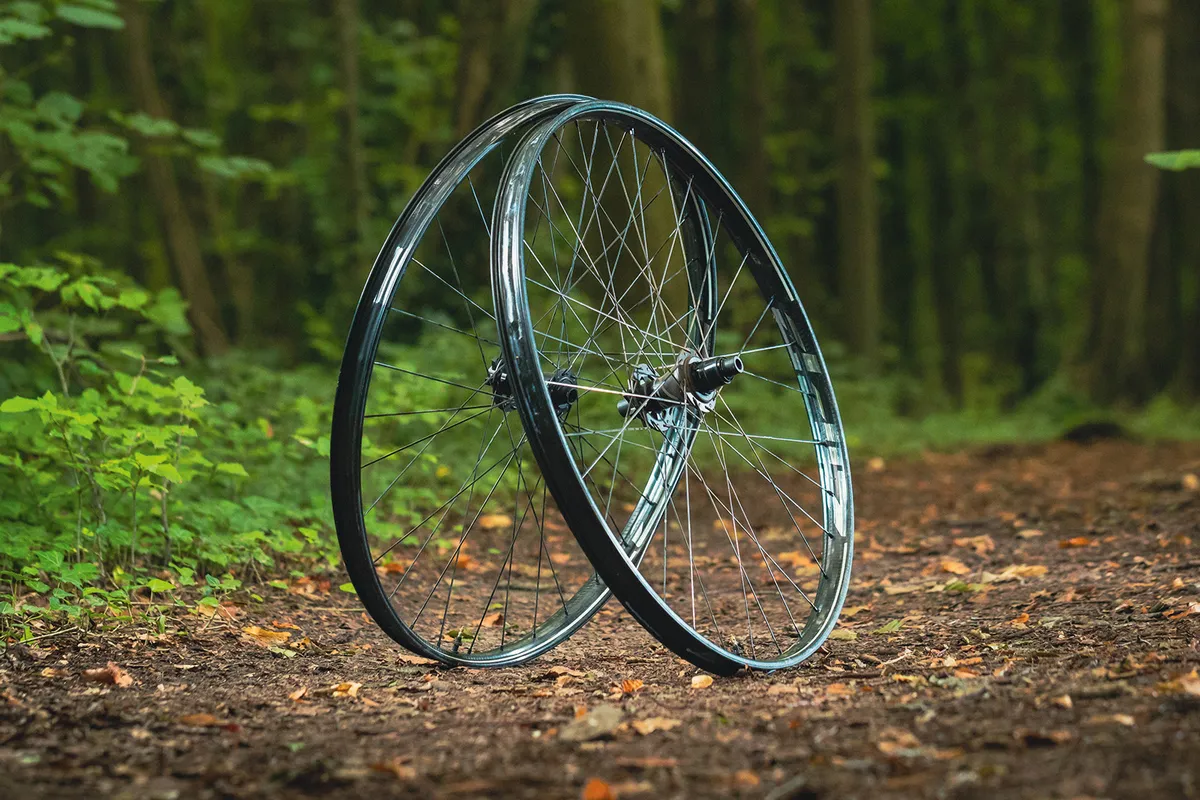
- Price: £1,645 as tested
These were the best-riding carbon wheels in one of our recent group tests, with a comfortable yet accurate feel. This might be down to the Motos’ single-wall rim, which pivots laterally around the spoke bed for improved traction, impact protection and comfort.
The rear hub is also one of the best, and it’s easy to access the well-sealed bearings. Its 2.7-degree engagement angle is among the quickest around, providing exceptional pick-up of pedal inputs.
Wheel feel can be hard to differentiate, but the Zipps deliver a noticeable (if slight) uplift in performance.
We could hold higher speeds with more control over line choice over off-camber roots. On landings, there’s a slightly damped feel. Each wheel has 32 bladed, J-bend spokes and five spoke lengths are used.
Getting tyres on and off is tricky and there’s no Shimano Micro Spline option, but they ride beautifully, have a lifetime warranty and accept the Quark TyreWiz gizmo for real-time pressure data.
Budget upgrade | Hunt Enduro Wide V2
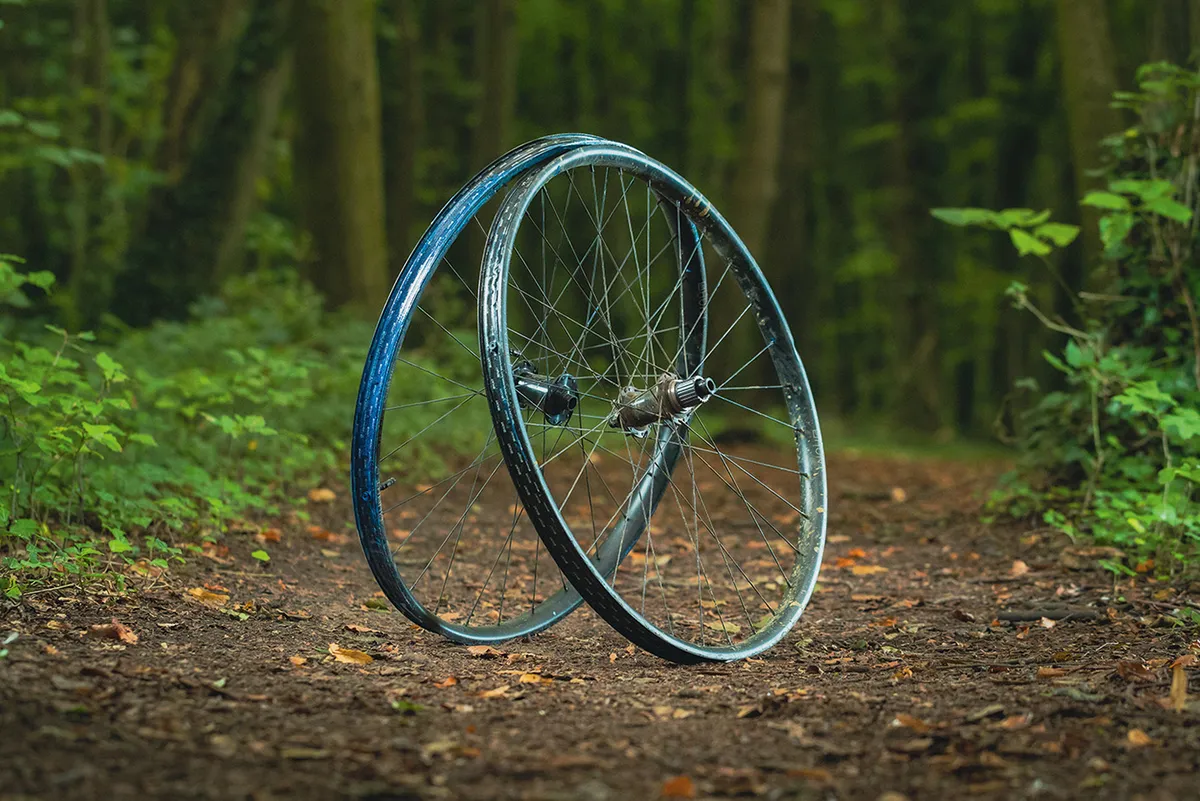
- Price: £379 as tested
Smooth yet accurate, snappy yet forgiving, our testers were consistently impressed by this wheelset. The front has a wider rim bed and lower spoke count (28) than the rear (32).
This gives it a ‘calmness’ that helps you hold a line over roots and rock gardens and results in more speed, comfort and control. At the back, the fast pick-up of Hunt’s own alloy hub has proven reliable.
With rims built from stronger 6069-T6 aluminium, the Enduro Wides are heavier than many trail wheels, as you’d expect for their intended enduro purpose, but only by a small margin.
The rear wheel can come with any freehub, as well as Boost or Super Boost hub spacing. Hunt will even sell you the wheels with Schwalbe or Maxxis tyres pre-installed, but tyres are easy to fit and blow up with just a track pump.
In addition to a three-year warranty, Hunt offers a 35 per cent crash-replacement scheme.
